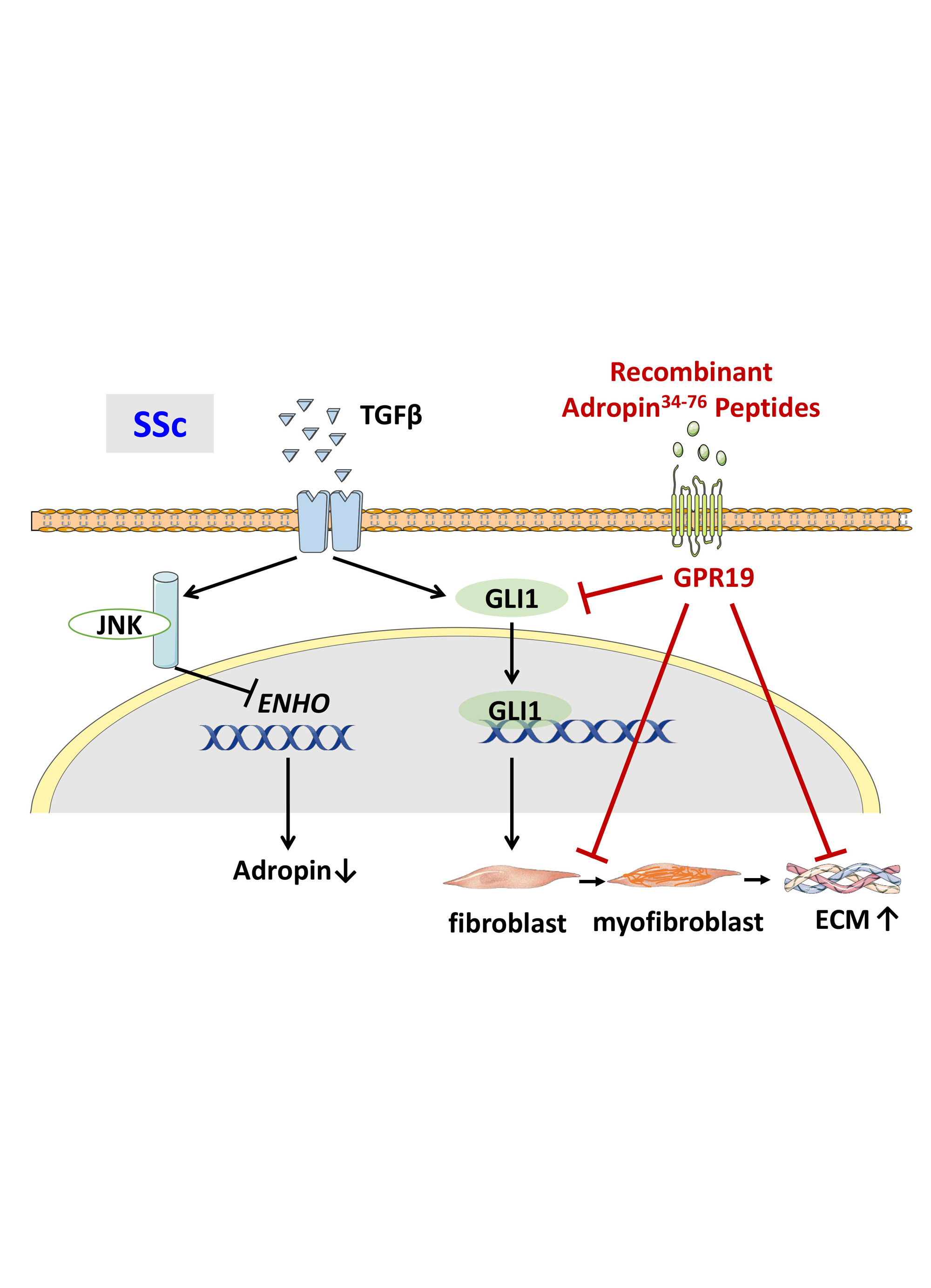Session Information
Date: Monday, November 13, 2023
Title: (0934–0964) Systemic Sclerosis & Related Disorders – Basic Science Poster
Session Type: Poster Session B
Session Time: 9:00AM-11:00AM
Background/Purpose: Adropin is a secretory protein encoded by the energy homeostasis – associated (ENHO) gene. Emerging evidence indicate its role in metabolism and energy homeostasis, which is known to be deregulated in Systemic Sclerosis (SSc). However, Adropin / ENHO has not been linked to the pathogenesis of fibrosis, tissue remodeling or fibroblast activation so far. The aim of the current study was to investigate the role of Adropin / ENHO in the pathogenesis of fibroblast activation and fibrosis in SSc.
Methods: Machine learning and bioinformatics models were used to identify candidate genes regulating fibroblast activation in SSc. The expression of Adropin / ENHO in skin samples of SSc patients and healthy individuals was analyzed by quantitative PCR, immunofluorescence and western blot, and validated by in silico data mining. The effects of Adropin were analyzed in cultured human fibroblasts, 3D skin equivalents, complimentary murine SSc models of sclerodermatous GvHD (sclGvHD) and bleomycin-induced lung fibrosis mice, and precision-cut human skin slices (PCSS). RNA sequencing (RNAseq) was performed to identify downstream regulatory pathways.
Results: Biostatistical screening of publically available datasets identified Adropin / ENHO as a potential molecular mediator involved in fibroblast activation with pronounced downregulation in SSc skin. We first confirmed the impaired expression of Adropin / ENHO in SSc patients and SSc models. TGFβ reduced Adropin / ENHO expression in a JNK-dependent manner. Recombinant Adropin peptides in turn inhibited TGFβ-induced fibroblast activation and subsequent fibrosis. Treatment of biologically active peptides Adropin34−76inhibited TGFβ induced fibroblast activation and extracellular matrix (ECM) production in cultured primary dermal fibroblasts, in 3D skin equivalents, as well as in PCSS. Moreover, therapeutical administration of Adropin34−76 in mice with preestablished fibrosis exerted potent antifibrotic effects in skin and lungs of two complimentary murine SSc models, sclGvHD and bleomycin-induced lung fibrosis mice. RNAseq demonstrated the antifibrotic effects of Adropin were functionally linked to hedgehog signaling and GLI1 deactivation, which experimentally confirmed in vitro and in vivo. Knockdown of GPR19, a putative receptor of Adropin, abrogated the therapeutic effect of Adropin on αSMA- and GLI1-expression in fibroblasts, indicating Adropin may regulate GLI1 signaling and fibroblast activation via GRP19.
Conclusion: We demonstrate a novel regulatory loop of Adropin / ENHO in TGFβ signaling: TGFβ inhibits the expression of Adropin / ENHO, while recombinant Adropin peptides inhibited fibroblast activation by GPR19-dependent inhibition of hedgehog / GLI1 signaling. Our findings characterize Adropin peptides as a potential approach to interfere with aberrant fibroblast activation and tissue fibrosis in SSc.
To cite this abstract in AMA style:
Liang M, Distler J. Attenuation of Fibroblast Activation and Fibrosis by Adropin in a Hedgehog-Dependent Manner [abstract]. Arthritis Rheumatol. 2023; 75 (suppl 9). https://acrabstracts.org/abstract/attenuation-of-fibroblast-activation-and-fibrosis-by-adropin-in-a-hedgehog-dependent-manner/. Accessed .« Back to ACR Convergence 2023
ACR Meeting Abstracts - https://acrabstracts.org/abstract/attenuation-of-fibroblast-activation-and-fibrosis-by-adropin-in-a-hedgehog-dependent-manner/

